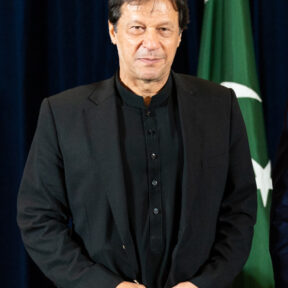
Imran Khan
: Photo from Wikimedia Commons / Author of Photo: The White HouseOverview
* Pakistani politician who publicized a false story alleging that U.S. military personnel had flushed a Koran down a toilet
* Claims that the “West is falling because of their addiction to sex and obscenity”
Imran Khan is a Pakistani politician who, on May 6, 2005, catapulted the erroneous 300-word Newsweek story about U.S. military personnel allegedly flushing a Koran down a Guantanamo Bay toilet into headline news across the Muslim world. He did this by brandishing the article at a press conference and demanding that Pakistani president Gen. Pervez Musharraf secure an apology from George W. Bush for the incident. The ensuing riots left 17 people dead and anti-American sentiment even higher than usual in the Muslim world. Just days before, Khan had tried to spark a similar firestorm over a Washington Times cartoon depicting the Pakistani government as America’s lapdog.
Khan embodies the hypocrisy of Muslim elites who inveigh against the West by day and enjoy its pleasures by night. His fame in Pakistan comes from cricket, not politics: Khan is the best cricketer Pakistan has ever produced. But in London many remember him as an even greater playboy. Throughout the 1980s Khan was linked to a string of beautiful women. In 1988 he told Australia’s Sunday Mail, “Pakistan society encourages marriage. There, I lead a very steady, comfortable life. Here, it is more exciting. The pace is faster. Because of the nightclubs and parties, it is a very good place to be single.”
But as his cricket career wound down and he began to develop political ambitions, Khan became more reticent to talk about his lifestyle. In 1992 when a London Evening Standard reporter asked him if he found his conquests fulfilling, he turned bashful: “Er, by answering that question I put myself in a difficult position because this will get quoted in Pakistan. And in Pakistan, the mere fact that you admit you’re having affairs upsets a lot of people’s sensitivities. I respect my own culture and a lot of young people look up to me. It’s a big responsibility for me not to make these admissions in public. Everyone knows I’m a single man and a normal man. But there’s no need to stick it down their throats.” His ex-girlfriends were less discreet, however. One observed to the Times, that same year, that Imran “juggled his girlfriends extremely elegantly . . . and he likes mangoes.”
After his playing career ended in 1992, Khan entered politics under the tutelage of Lt.-Gen. Hamid Gul, the former Pakistani intelligence chief famous for fueling the Taliban’s rise in Afghanistan. (Gul believes that September 11 was a U.S. conspiracy.) Khan, a man who once captained the Oxford University cricket team and was a feature at London’s trendiest places, now turned against the culture he had previously enjoyed.
In 1995 he denounced the West with its “fat women in miniskirts” and proclaimed that the “West is falling because of their addiction to sex and obscenity.” He also chastised Pakistanis who looked to the West for ideas, saying “I hate it when our leaders or elite feel that by licking the soles of the feet of foreign countries we will somehow be given aid and we will progress.”
So it came as something of a surprise that year when he married an English society beauty, Jemima Goldsmith, who was half his age and, far worse — for the Islamists he was courting politically — half-Jewish. The reaction to the marriage in Pakistan was hostile and put a rapid stop to Khan’s political momentum. In a Pakistani newspaper column defending his marriage Khan mused that, “I suppose if my marriage proves one point, it is that I am not a politician.”
Khan initially won liberal and Western hearts by building a cancer hospital and fashioning himself as a reformer, but he has turned increasingly to hard-line Islamist politics. After Khan cast a vote in favor of the Islamist candidate for prime minister in 2002, a leader in his party told a Pakistani monthly, “Khan has more than a soft corner for the ousted Afghan Taliban. He thinks that the orthodox religious militia did a great service to Afghanistan and Islam before they became a target of the Americans.” However, Khan could never become the standard-bearer of Pakistan’s Islamists while married to a Western girl — even if she had converted to Islam. In 2004 he and Goldsmith divorced, each citing cultural differences.
Khan’s ambition burns brightly but he is the only member of his party in parliament, and enjoys little popular support. His strategy for getting to the top is to climb on the anti-Musharraf bandwagon. “By the time we have the next general elections,” said Khan recently, “we would see two broad-based political alliances in the country, pro-Musharraf and anti-Musharraf.” The easiest way to attack Musharraf is to attack his American protectors.
But Khan does not scorn America entirely: He likes its money. On May 15, 2005, just days after the riots killed 17 people and injured dozens of others, Khan was in Washington, D.C. raising $175,000 for his cancer hospital. His fundraising tour also took him to Denver, Los Angeles, and New York.
Even his political allies find Khan’s duplicity difficult to accept. In 2002 one of his party leaders remarked: “Even we are finding it difficult to figure out the real Imran. He dons the shalwar-kameez and preaches desi and religious values while in Pakistan, but transforms himself completely while rubbing shoulders with the elite in Britain and elsewhere in the West.”
Khan served as the Prime Minister of Pakistan from 2018-2022. On April 10, 2022, a no-confidence vote ousted him from office.
This profile is adapted from the article “Khan Artist” written by James Forsyth and Jai Singh, and published by The Weekly Standard on May 31, 2005.